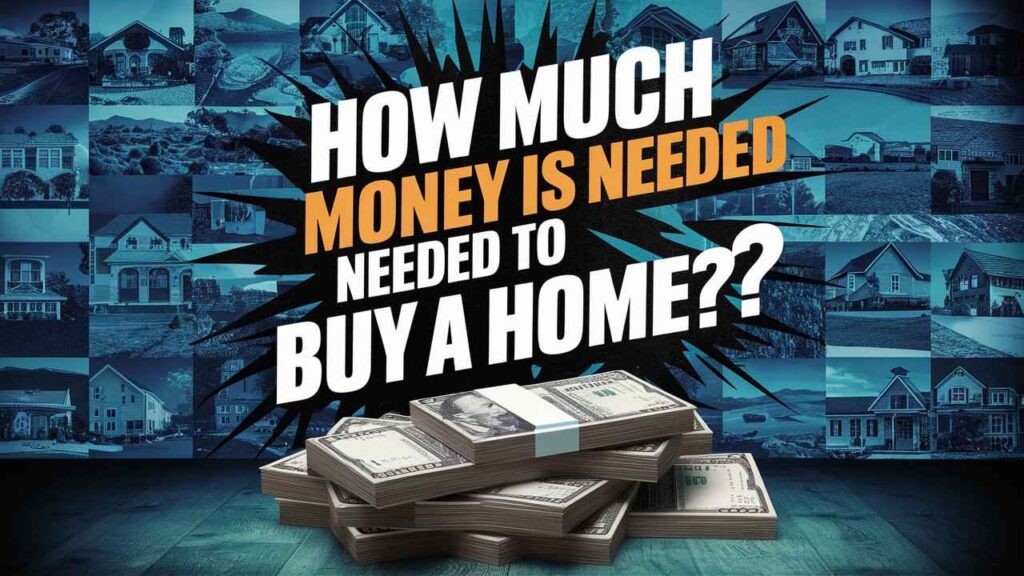Setting the Scene: The Quest for Homeownership in 2024
Picture this: you’re scrolling through a sea of charming houses on the internet, daydreaming about that perfect kitchen where you can finally master the art of gourmet cooking🏠or at least microwave pizza with flair. As 2024 unfurls its banner of opportunities, the quest for homeownership beckons, and you’re not alone. Millennials and Gen Z are diving headfirst into the housing market like kids into a ball pit, all fueled by the desire to escape the clutches of rent and embrace the freedom of owning their own castle. However, before you embark on this exciting adventure, it’s vital to don your financial armor and understand just how much loot you’ll need to stash away.

Why Knowing the Cost Matters More Than Ever
In this post-pandemic world, where the cost of avocado toast has practically become a national crisis, knowing the financial landscape of buying a house is akin to having a treasure map. The housing market has experienced its fair share of twists and turns🏠think rollercoaster, but without the safety harness. Prices fluctuate, interest rates sway, and hidden expenses lurk around every corner. In short, being financially prepared is no longer a luxury; it’s a necessity. Buckle up as we unravel the mysteries of homeownership costs in 2024!
The Price Tag: What Does Buying a Home Really Cost?
Let’s start with the obvious: the price tag. It’s like walking into a candy store and seeing a jaw-dropping selection of goodies, only to discover that your wallet is, well, rather bare. The median home price varies wildly depending on location, size, and the elusive “it factor.” In 2024, you might find prices ranging from a modest starter home in the suburbs to a luxurious high-rise in the city. But remember, the purchase price is merely the tip of the iceberg!
Beyond the Sale Price: Hidden Expenses You Can’t Ignore
Ah, hidden expenses🏠the mischievous gremlins of the home-buying process. It’s crucial to dig deeper than the sale price to unearth the actual costs of buying a home. These can include property taxes, homeowners’ association fees (HOAs), and maintenance costs, all waiting in the shadows to pounce on your bank account. Let’s not forget about the costs of moving, which can be as exhilarating as it is exhausting. Make sure to keep your financial eyes wide open; the last thing you want is to find yourself in a money pit!

Down Payments: The Big Chunk
How Much Is the Standard Down Payment? Spoiler Alert: It’s Not Just 20%!
The traditional wisdom surrounding down payments usually conjures the image of 20%🏠a magical figure that seems to grant you instant homeowner status. However, in 2024, the landscape has changed. Many lenders now offer down payment options that can be as low as 3%, or even zero for certain programs. Yes, you heard that right! While a larger down payment might reduce your monthly mortgage and save you on interest, flexibility has become the name of the game. Explore your options, and you might find yourself with a pleasantly plump piggy bank.
Zero Down? The Low-Down on No-Down Payment Options
For those with the cash flow of a potato chip (aka not much), the concept of zero down payment options can feel like a fairy tale. Yet, some programs designed for first-time homebuyers or veterans allow you to buy a home without putting any money down. These programs can include FHA loans, VA loans, or USDA loans, each with its own criteria and benefits. Just remember, while these options are enticing, they might come with higher mortgage insurance premiums or interest rates, so weigh your choices wisely.

Closing Costs: The Other Shoe to Drop
What Are Closing Costs and Why Are They Sneaky?
Imagine you’ve finally found your dream home, and you’re ready to pop the champagne. But wait! The closing costs are lurking, like that final boss in a video game you didn’t see coming. Closing costs typically range from 2% to 5% of the purchase price and can include a variety of fees, such as loan origination fees, appraisal fees, and title insurance. These costs can be surprisingly sneaky, popping up just when you think you’re in the clear. Always budget for them, or you might find yourself trapped in a financially precarious position.
Typical Closing Costs: Breaking Down the Numbers
Let’s break down these sneaky closing costs. If you’re buying a home priced at $300,000, you might be looking at anywhere from $6,000 to $15,000 in closing costs. To make it simpler, here’s a quick rundown:
- Loan Origination Fees: Usually about 1% of the loan amount.
- Appraisal Fees: Ranging from $300 to $600, because, apparently, someone must physically verify your new castle’s worth.
- Title Insurance: Typically around 0.5% to 1% of the purchase price.
- Escrow Fees: Fees for managing the closing process can range from $300 to $1,000.
Add all these numbers up, and you’re likely to find a hefty sum that could take the wind out of your sails.

Monthly Mortgage Payments: The Ongoing Adventure
Principal, Interest, Taxes, and Insurance: The Four Horsemen of Mortgages
Once the dust settles on your buying a house escapade, the monthly mortgage payments emerge as the next chapter in your homeownership saga. These payments generally encompass four main components, often dubbed the Four Horsemen: Principal, Interest, Taxes, and Insurance (PITI).
- Principal: The original loan amount, gradually decreasing with each payment.
- Interest: The lender’s fee for the privilege of borrowing money.
- Taxes: Property taxes collected by your local government.
- Insurance: Homeowners insurance to protect your investment.
Understanding these components is crucial, as they will dictate your monthly budget and ultimately determine how much room you have left for indulgences like takeout sushi or that new gaming console.
How to Estimate Your Monthly Payments Without a Crystal Ball
Now, if only there were a magic crystal ball to predict your exact monthly mortgage payment. Alas, we have to rely on calculators and spreadsheets instead! To estimate your monthly payments, you can use an online mortgage calculator. Input the home price, down payment, loan term, interest rate, and voila! A ballpark figure materializes. Remember, though, that this is just an estimate🏠life has a way of throwing curveballs, especially when it comes to finances.

Home Inspections: An Expense You Can’t Skip
Why Home Inspections Are Worth Every Penny
Imagine moving into your dream home only to discover a hidden mold infestation lurking in the basement. A home inspection might not sound like the most thrilling part of the buying a house process, but it’s an expense you cannot afford to overlook. A thorough inspection reveals the true condition of the property, providing peace of mind and potentially saving you from future financial disasters. Think of it as hiring a detective to unveil the secrets your charming abode might be hiding!
Typical Inspection Costs: Is Your Future Home Hiding Something?
The average cost of a home inspection in 2024 ranges from $300 to $500, depending on the property’s size and location. While it might feel like an extra expense, consider it an investment in your future. If the inspector uncovers issues that could lead to costly repairs, you’ll be grateful you spent that money upfront. After all, ignorance may be bliss, but it’s certainly not financially sound!🏠

Homeowner’s Insurance: Protecting Your Investment
How Much Is Needed for Homeowner’s Insurance? Spoiler: It’s a Must!
In the grand tapestry of homeownership, homeowner’s insurance is a critical thread that you can’t afford to ignore. This insurance covers damages to your home and personal property, along with liability for accidents that happen on your property. In 2024, the average cost of homeowner’s insurance is around $1,200 per year, but this can vary significantly based on factors like location, coverage limits, and your deductible. Just remember, it’s better to have it and not need it than to need it and not have it!
What Does Homeowner’s Insurance Cover Anyway?
Homeowner’s insurance typically covers:
- Dwelling Coverage: Protection against damage to the structure of your home.
- Personal Property Coverage: Safeguarding your belongings from theft or damage.
- Liability Protection: Covering legal expenses if someone is injured on your property.
- Additional Living Expenses: Helping you pay for accommodations if your home becomes uninhabitable.
Knowing what your insurance policy covers can save you a world of headaches and financial woes, so be sure to read the fine print!
Property Taxes: The Inevitable Cost of Living
Understanding Property Taxes: What’s the Damage?
Property taxes are an inescapable reality of homeownership, like that pesky mosquito buzzing around your head on a summer night. These taxes are levied by local governments and can range from 0.5% to 2.5% of your property’s assessed value annually. While it might feel like an unwanted expense, these taxes help fund essential services like schools, roads, and emergency services. So, as you hand over your hard-earned cash, remember that you’re contributing to the greater good (and wishing you could do it in a more fun way).
How to Calculate Your Property Taxes Like a Pro
Calculating your property taxes is simpler than you might think. Start with the assessed value of your home and multiply it by the local tax rate. For example, if your home is valued at $300,000 and the tax rate is 1.25%, your annual property tax would be $3,750. Remember to set aside a portion of your monthly budget to cover these taxes, ensuring they don’t catch you off guard when the bill arrives.
Maintenance and Repairs: Budgeting for the Unexpected
The 1% Rule: How Much Should You Set Aside for Home Repairs?
As a new homeowner, expect the unexpected🏠especially when it comes to maintenance and repairs. The 1% rule suggests you should budget about 1% of your home’s value each year for maintenance costs. So, for a $300,000 home, that would mean setting aside around $3,000 annually for repairs and upkeep. While it may feel like a hefty chunk, having a financial cushion can save you from an emotional breakdown when your roof decides to spring a leak or your HVAC system throws a tantrum.
DIY vs. Hiring a Pro: Which Costs Less in the Long Run?
Ah, the eternal debate: DIY or hire a professional? Tackling projects yourself can save you a pretty penny, but be wary of your skills (or lack thereof). If you’re not a handyman (or handywoman), it may end up costing you more to fix the mess than to hire a pro from the start. Weigh the costs carefully🏠sometimes it’s worth spending a little extra to avoid the headache of an incomplete project or a botched repair.
The Importance of a Budget
Crafting a Home-Buying Budget: Your Roadmap to Success
Now that you’re armed with knowledge about costs, it’s time to create a home-buying budget. Think of it as your treasure map guiding you through the often murky waters of homeownership. Start by listing all your expected expenses, including down payments, closing costs, monthly payments, and maintenance. Factor in your income, savings, and any potential financial assistance. This budget will be your compass, keeping you on track and ensuring you don’t overspend on that unexpected chandelier for your new living room.
The 50/30/20 Rule: A Handy Guide for New Homeowners
One of the most effective budgeting methods is the 50/30/20 rule. This formula allocates 50% of your income to needs (like housing and groceries), 30% to wants (like eating out and that fancy coffee), and 20% to savings or debt repayment. As a new homeowner, adjust these percentages to accommodate your new expenses while still leaving room for life’s little luxuries. It’s a balancing act, but with careful planning, you can master it like a pro!🏠
First-Time Homebuyer Programs: Money-Saving Opportunities
Government Programs That Can Help You Buy a Home
For those venturing into the realm of homeownership for the first time, government programs can be a lifeline. Various initiatives are designed to make homeownership more accessible, offering perks like down payment assistance, favorable loan terms, and even tax credits. Programs such as FHA loans and NHS (Neighborhood Housing Services) can provide substantial support, so don’t hesitate to explore these money-saving opportunities.
Local Assistance Programs: Don’t Leave Money on the Table!
In addition to federal programs, many states and local governments offer assistance tailored to their residents. From grants to forgivable loans, these programs can alleviate the financial burden of buying a house. Research your area’s offerings to ensure you’re not leaving money on the table. Every little bit helps, especially when it comes to building the home of your dreams!🏠
The Role of Credit Scores in Home Buying
How Your Credit Score Affects Your Home Buying Power
Your credit score is the unsung hero of the home-buying saga. A higher score can unlock better interest rates, lower down payment requirements, and even give you an edge in a competitive market. Conversely, a lower score can lead to higher costs or even disqualification from certain loan programs. Understanding your credit score and its impact on your buying power is crucial in the journey to buy a home.
Tips for Improving Your Credit Score Before You Buy
If your credit score needs a little TLC, fear not! You can take proactive steps to boost it before applying for a mortgage. Start by paying down high credit card balances, ensuring all bills are paid on time, and checking your credit report for errors. Additionally, refrain from taking on new debt before your home purchase, as this could negatively impact your score. !– /wp:paragraph –>
Final Thoughts: Calculating Your Unique Needs
Personal Financial Factors: How Your Situation Influences Costs
When determining how much money you need to buy a home, it’s crucial to consider your personal financial situation. Factors such as income, debt-to-income ratio, savings, and lifestyle choices all play a role in shaping your budget. Tailoring your financial plan to fit your unique needs will empower you to make informed decisions throughout the buying process.
Preparing for the Emotional Rollercoaster of Home Buying
Finally, prepare yourself for the emotional ups and downs that accompany home buying. It can be a thrilling journey filled with excitement and anticipation, but it may also bring moments of stress and uncertainty. Embrace the ride, stay focused on your goals, and lean on your support system to help navigate the choppy waters of the home-buying process.🏠
Conclusion
Recap: How Much Money Is Needed to Buy a Home in 2024
In the end, the amount of money needed to buy a home in 2024 varies based on several factors, including location, market conditions, and personal financial situations. From down payments and closing costs to ongoing expenses like monthly mortgage payments and maintenance, understanding the full scope of costs is paramount. Equip yourself with knowledge and a solid budget, and you’ll be well on your way to turning your dream of homeownership into a reality.
Taking the First Step: Ready, Set, Buy!
So, are you ready to take the plunge? It’s time to gather your resources, research your options, and embark on the exciting journey of buying a house. With the right mindset and preparation, you’ll navigate the twists and turns with confidence, ultimately achieving the dream of homeownership!
People Also Ask
How much to buy a house in the USA?
The cost to buy a house in the USA varies significantly based on location, size, and market conditions. As of 2024, the median home price is approximately $420,000. However, prices can range from under $200,000 in some regions to well over $1 million in areas like California and New York.
Average Price Ranges
- Low-Cost Areas: $150,000 – $300,000
- Mid-Range Areas: $300,000 – $600,000
- High-Cost Areas: $600,000 and above
How much money do I need to buy a house in New York?
In New York, especially in metropolitan areas like NYC, the financial requirements can be quite steep. To buy a house, you’ll typically need to consider:
Down Payment
- Standard: 20% of the purchase price, but many lenders allow as low as 3% to 5%.
Closing Costs
- Generally range from 2% to 5% of the purchase price.
Example Calculation
For a $700,000 home:
- Down Payment (20%): $140,000
- Closing Costs (3%): $21,000
- Total: Approximately $161,000 needed upfront.
How much is it to buy a house in Canada?
In Canada, the cost of buying a house also varies widely by province and city. As of 2024, the national average price for a home is around CAD 800,000, but in cities like Toronto and Vancouver, prices can soar to over CAD 1 million.
Regional Price Differences
- Toronto/Vancouver: CAD 1 million +
- Calgary/Edmonton: CAD 500,000 – CAD 600,000
- Winnipeg/Halifax: CAD 300,000 – CAD 400,000
What’s the best time to buy a house?
The best time to buy a house generally coincides with market conditions and personal financial readiness. Typically, spring (March to June) is a popular time as more homes are listed. However, buying during the winter months can yield better deals due to less competition.
Seasonal Insights
- Spring: More inventory but competitive prices.
- Summer: Still good inventory but rising prices.
- Fall/Winter: Less competition; potential for lower prices.
How long do most people live in their first home?
On average, people tend to stay in their first home for about 5 to 7 years. However, this can vary widely based on personal circumstances, job changes, and market conditions.
What is the latest age to buy a house?
There isn’t a definitive “latest age” to buy a house, but many people consider purchasing in their late 30s to early 40s. However, individuals in their 50s or 60s also buy homes, often downscaling or moving to retirement communities.
What age car is best to buy?
Generally, the best age for buying a car is around 2 to 4 years old. Vehicles in this age range often have a good balance of affordability and reliability, as they typically have already undergone significant depreciation while still being under warranty.
How much salary is needed to buy a home in the USA?
To afford a home in the USA, a general rule of thumb is that your annual income should be at least 3 to 4 times the purchase price of the home. For example, if you’re looking at a home priced at $420,000, you should aim for a salary of approximately $105,000 to $140,000 per year.
How much is a 3-bedroom house in the USA?
As of 2024, the median price for a 3-bedroom house in the USA hovers around $350,000. However, this figure varies widely by location, with prices in urban centers being considerably higher than those in rural areas.
How much is the cheapest house in the USA?
The cheapest houses in the USA can be found in various markets, often starting as low as $50,000 to $100,000. These homes may require significant renovations and are often located in less desirable areas.
How much is a little house?
The cost of a “little house” or tiny home varies based on factors like location and materials used. Generally, prices for tiny homes range from $30,000 to $100,000. Custom builds or those in high-demand areas can exceed this range.
Can I live in the USA if I buy a house?
Buying a house in the USA does not automatically grant residency or citizenship. However, it may support your application for a visa, depending on your circumstances and the visa type you pursue.
How much is a normal house in the USA?
A “normal” house, typically considered a median home, costs around $420,000 in the USA as of 2024. This price reflects a broad average, with actual costs varying greatly by region and city.
Who can afford NYC?
Affording to live in New York City typically requires a household income of at least $100,000 to comfortably manage rent or mortgage payments. However, many households earning much higher incomes still struggle due to the high cost of living.
Can I afford a home in NYC?
Affording a home in NYC depends on your income, savings, and the specific neighborhood. Generally, buyers should aim to spend no more than 30% of their income on housing.
What is a good salary in NYC in 2024?
A good salary in NYC in 2024 is considered to be around $100,000 or more. However, many professionals in high-demand fields earn significantly more to maintain a comfortable lifestyle amid the city’s high costs.
How expensive is a house in NYC?
As of 2024, the median home price in NYC is approximately $1 million. However, prices can range dramatically, with some neighborhoods commanding well over $2 million for a typical home.
How much do I need to earn to live in NYC?
To live comfortably in NYC, a household typically needs to earn at least $100,000 per year. This allows for housing, transportation, and everyday living expenses without excessive financial strain.
Is it worth buying a house in NYC?
Buying a house in NYC can be worth it for many, especially if you plan to stay long-term. Real estate values tend to appreciate over time, making it a solid investment. However, potential buyers should weigh the high costs against their financial goals and lifestyle preferences.
How much is a house in Japan?
In Japan, the average price of a house varies widely by location. As of 2024, the national average is around ¥35 million (approximately USD 250,000). However, prices in urban areas like Tokyo can exceed ¥70 million (around USD 500,000).
How much is a house in Australia?
As of 2024, the median house price in Australia is about AUD 1 million. Major cities like Sydney and Melbourne often see prices significantly higher, while rural areas may offer homes for under AUD 500,000.
How much does a house cost in the UK?
In the UK, the average house price as of 2024 is approximately £280,000. London, however, significantly skews this figure, with average prices often exceeding £600,000.
Can a foreigner buy a house in Canada?
Yes, a foreigner can buy a house in Canada. However, they may face certain restrictions and additional taxes, depending on the province and local laws. It’s essential to research the specific regulations in the area you’re considering.
What’s the best age to buy a house?
The best age to buy a house is subjective, but many financial experts suggest that late 20s to early 30s is an ideal time. At this age, individuals often have established careers and the ability to save for down payments.
What month are houses cheapest?
Typically, homes are cheapest during the winter months (December to February) when demand is lower, and fewer buyers are in the market. Sellers may be more willing to negotiate during this time.
What season is cheapest to buy a house?
Fall and winter are generally considered the cheapest seasons to buy a house. During these months, you may find less competition and more favorable prices as sellers are eager to close deals before the holidays.
What is the quickest time to buy a house?
The quickest time to buy a house can vary, but on average, the process can take 30 to 60 days from the time an offer is accepted to closing. However, if you’re well-prepared and in a favorable market, you might close in as little as two weeks!









